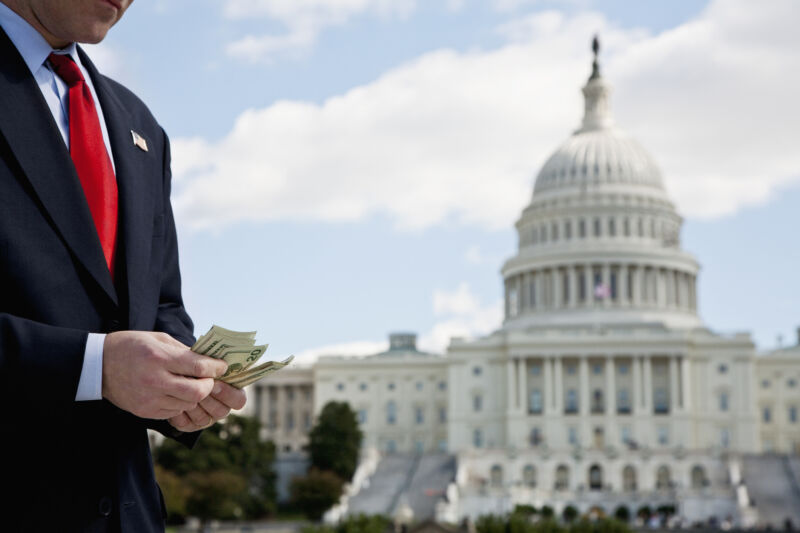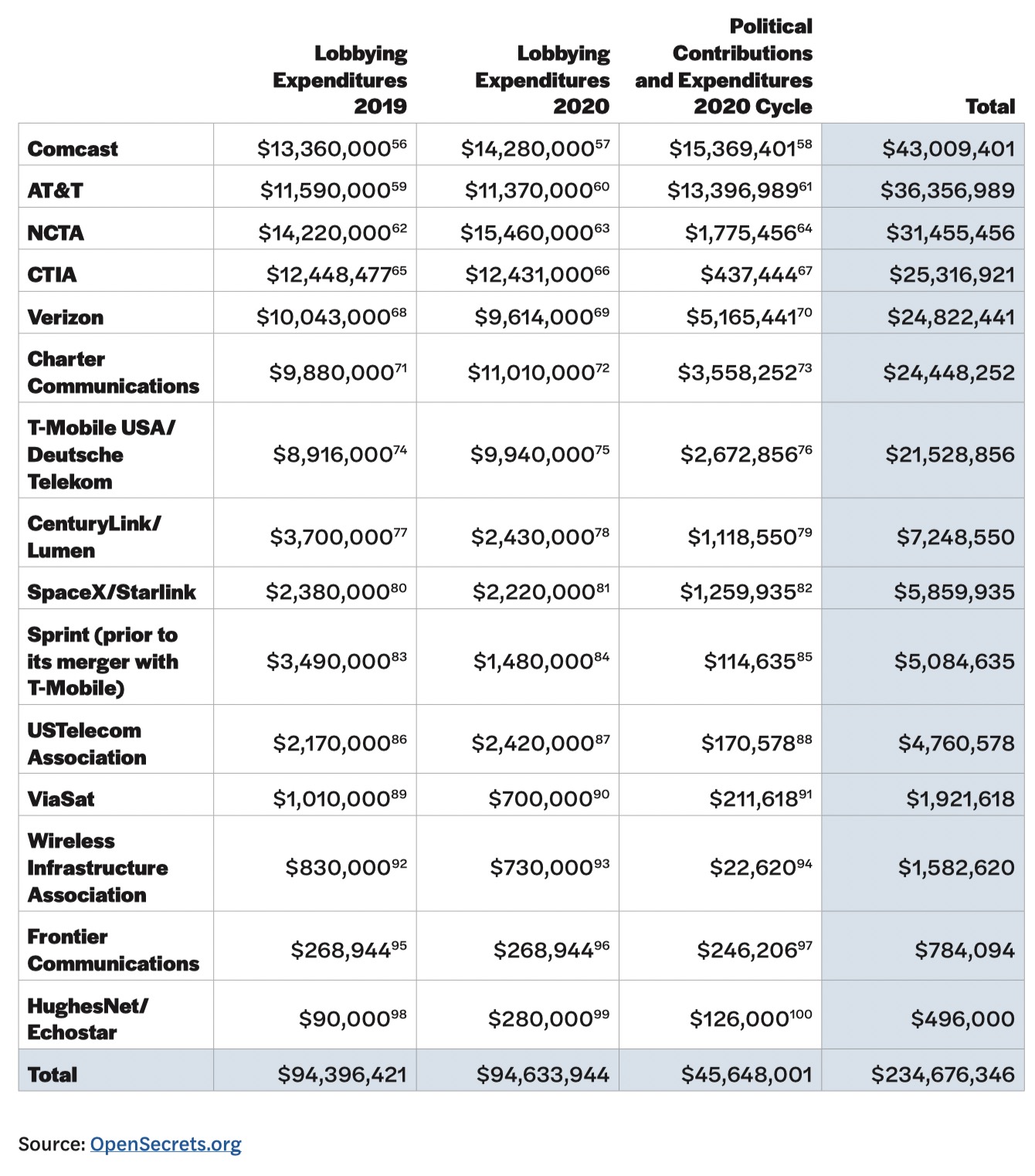How Do Isps Give Money To Politicians
Big spenders —
ISPs spent $235 1000000 on lobbying and donations, "more $320,000 a day"
Common Cause study says manufacture lobbying of Congress worsens the digital dissever.

The biggest Internet service providers and their trade groups spent $234.7 million on lobbying and political donations during the most recent two-twelvemonth congressional cycle, according to a report released yesterday. The ISPs and their trade groups lobbied against strict internet neutrality rules and on various other telecom and broadband regulatory legislation, said the written report written by advancement grouping Common Cause.
Of the $234.7 1000000 spent in 2019 and 2020, political contributions and expenditures accounted for $45.6 million. The residual of it went to lobbying expenditures.
Comcast led the mode with $43 million in lobbying and political contributions and expenditures combined during the 2019-2020 cycle, the study said. The highest-spending ISPs after Comcast were AT&T with $36.iv one thousand thousand, Verizon with $24.8 million, Charter with $24.4 meg, and T-Mobile with $21.5 1000000.
"The dollar amounts are shocking," the written report said. "In total, these corporations spent more than $234 million on lobbying and federal elections during the 116th Congress—an average of more than $320,000 a day, seven days a week!"
Cable and wireless lobbies spent big
The cable and wireless manufacture'south superlative lobbying organizations were third and fourth in spending overall as cable group NCTA spent $31.v million and wireless group CTIA spent $25.3 one thousand thousand. USTelecom, which represents telcos including AT&T and Verizon, spent $4.8 1000000.
The residuum of the $234.7 million came from CenturyLink with $7.2 million, SpaceX/Starlink with $v.9 one thousand thousand, Sprint with $5.ane meg prior to its merger with T-Mobile, ViaSat with $1.9 one thousand thousand, the Wireless Infrastructure Association with $1.6 million, Borderland with $784,000, and HughesNet with $496,000.
The Mutual Cause report cites entrada-finance data from OpenSecrets.org and includes this table:

Common Crusade
Common Crusade got help writing the report from the Communications Workers of America union that represents employees of AT&T, Verizon, and other telcos.
Common Cause itself spent $210,000 on lobbying in the two-year wheel and made $35,149 in political contributions, co-ordinate to OpenSecrets. The Communications Workers of America made $x million in contributions and spent $two.2 one thousand thousand on lobbying.
Internet neutrality lobbying
Net neutrality was i of the top regulatory bug for broadband lobbyists as they fought the Democrats' "Save the Cyberspace Act." In its original version, the bill would have reversed the Federal Communications Commission's repeal of net neutrality rules and reinstated the Championship Two common-carrier regulatory organization implemented during the Obama era. The Autonomous-majority House of Representatives passed the bill, merely then-Senate Majority Leader Mitch McConnell (R-Ky.) declared it "dead on inflow" in the Senate.
"When the House voted to pass the Salvage the Cyberspace Deed, ISPs condemned lawmakers for advancing 'a highly controversial, partisan proposal that puts the Net nether heavy-handed government control,'" the Mutual Cause written report said. "Given this celebrated opposition to net neutrality and Title II potency, information technology is no surprise why the Save the Internet Human activity did not fifty-fifty receive a vote in the Senate, despite bipartisan passage in the House and polling that showed 77 percent of Republicans and 87 percent of Democrats support net neutrality principles."
Eight of the xv ISPs and lobby groups analyzed by Common Cause revealed in required disclosures that they lobbied on this bill, the report said. Those include AT&T, Comcast, NCTA, and USTelecom. Merely while "federal law requires lobbying disclosure reports to include a list of specific bill numbers 'to the maximum extent practicable,'" some of the ISPs did not study lobbying on specific bills.
Mutual Cause explained:
Frontier Communications, for instance, failed to report its lobbying on specific bills simply did report paying lobbyists $537,888 during the 116th Congress to lobby on topics that included "rural broadband deployment and adoption" and "broadband mapping bug." Similarly, HughesNet didn't report lobbying on any specific legislation but paid lobbyists $370,000 to lobby on "broadband infrastructure" and "issues related to satellite broadband legislation." SpaceX reported lobbying on "satellite broadband policy and matters related to satellite spectrum" in every reporting period but didn't disclose lobbying on any specific broadband bills...
Other ISPs reported lobbying on some specific broadband legislation but also used broad categories to describe some of their lobbying. Comcast, for example, did not report lobbying on the Broadband Data Act, a broadband mapping bill, but reported lobbying on "rural broadband deployment and mapping." Similarly, Comcast didn't report lobbying on the RESILIENT Networks Act but did report lobbying on "network resiliency."
ISPs' fight confronting net neutrality as well involved funding a entrada in 2017 that generated "viii.5 million fake comments" to the Federal Communications Commission in social club to "manufacture support for repeal," according to a recent study issued by New York State Attorney General Letitia James.
Cobweb-deployment pecker failed among lobbying
ISPs besides focused heavily on the Attainable, Affordable Internet for All Act, which would have spent $80 billion to deploy hereafter-proof broadband infrastructure nationwide, directed the FCC to collect and publicize information on broadband prices, and eliminated state laws that preclude the growth of municipal broadband, amidst other things. The pecker prioritized fiber by requiring federally funded ISPs to provide low latency and speeds of at least 100Mbps for both downloads and uploads and by defining "unserved" areas equally those defective access to 25Mbps speeds on both the download and upload side.
Half-dozen of the 15 ISPs and trade groups reported lobbying on the bill, including AT&T, Charter, NCTA, T-Mobile, USTelecom, and Verizon, Mutual Cause wrote, adding:
The Attainable, Affordable Internet for All Act seeks to address the digital divide, and ISPs want to define both the split up and its solutions to their benefit. Industry lobbyists have persistently disseminated talking points at the federal and state levels advocating for lower speed requirements and "applied science neutrality," both of which aim to limit the preference given to fiber-optic broadband in publicly funded deployment, despite the clear superiority of that technology. ISPs take besides been incredibly effective over the years, lobbying at the country level to prohibit municipal broadband and cooperatives from serving communities that take been abased past existing providers. Further, the industry has resisted calls for price transparency... and in part owing to the successful efforts of ISP lobbyists, the Accessible, Affordable Internet for All Human action did not even receive a vote in the House or Senate during the 116th Congress.
Other bills that failed amid broadband-industry lobbying included the RESILIENT Networks Act, which would change the Communications Human activity "to crave coordination from providers of communications services during times of emergency" and require the FCC to "meliorate how networks share outage information with first responders," Mutual Cause wrote. Another was the CONNECT at Home Deed that would have prohibited ISPs "from terminating service to a client during the COVID-19 pandemic and up to 180 days after the pandemic is declared to exist over."
ISPs have "profoundly shaped" The states policy
Congress approved the Broadband DATA Act, which required the FCC to create more than accurate broadband-availability maps. AT&T and other ISPs fought confronting stricter mapping requirements for years but dropped some of their objections when it became clear that Congress was going to require more accurate maps anyway.
Common Cause wrote:
Despite the industry'due south back up for more authentic broadband maps, big ISPs played a pregnant office in influencing this legislation to focus strictly on collecting more than granular deployment information while ignoring other metrics critical to assessing broadband availability and painting an authentic movie of the digital divide... despite advocacy from public involvement groups, the Broadband DATA Act lacks any requirements for ISPs to study on key metrics, including actual speeds, latency, and pricing information. Indeed, large ISPs take opposed mapping efforts that seek to include nondeployment-related data. For instance, the industry openly criticized the Biden administration's recently released interactive broadband map, which includes publicly available information on speeds, pricing, and other metrics. While the Broadband DATA Deed will get united states much closer to granular deployment data, ISP lobbying was successful in limiting Congress' ability to require more data collection across other broadband-related metrics.
The Mutual Cause written report urged Congress to crave more specific lobbying disclosures and to pass broadband bills such as the Accessible, Affordable Internet for All Act. Common Cause also lobbied for net neutrality rules and stricter regulation in general, saying that the Trump-era deregulatory approach contributed to rise broadband prices, "a lack of transparent billing practices, and reports of mobile carriers selling their customers' real-time location information."
"Political spending by AT&T, Comcast, Verizon, and other major ISPs has profoundly shaped the contours of the digital divide," Common Crusade wrote. "Just the fight is not over. There are a number of steps our elected officials can have to give power back to the people and brainstorm to close the digital divide."
Disclosure: The Advance/Newhouse Partnership, which owns thirteen percent of Charter, is part of Advance Publications. Advance Publications owns Condé Nast, which owns Ars Technica.
Source: https://arstechnica.com/tech-policy/2021/07/isps-spent-235-million-on-lobbying-and-donations-more-than-320000-a-day/
Posted by: luptontiloot.blogspot.com

0 Response to "How Do Isps Give Money To Politicians"
Post a Comment